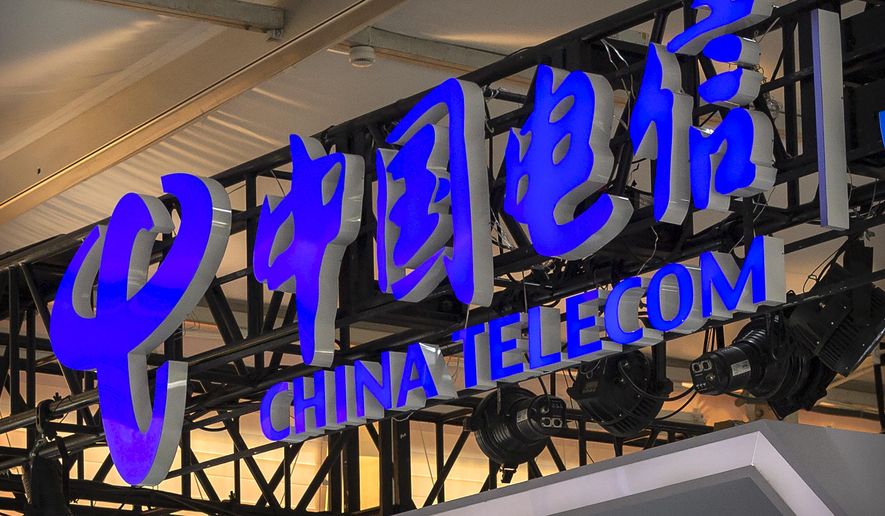The New York Stock Exchange, under pressure from the Trump administration, reversed itself for a second time this week and has agreed to block trading in three major Chinese telecommunications firms over their links to China’s military.
The action followed a phone call from Treasury Secretary Steven Mnuchin to the NYSE President Stacey Cunningham on Tuesday, a day after the stock exchange said that it would not delist the companies, a senior U.S. official said.
The initial lifting of the ban on Monday won praise from Beijing, where state media said it marked a sign of a return to pro-China policies by the incoming administration of President-elect Joe Biden.
The exchange announced late Monday that, after consulting with the Treasury Department’s Office Foreign Assets Control (OFAC), the three companies — China Mobile Ltd., China Telecom Corp. and China Unicom (Hong Kong) Ltd. — could continue trading their stock.
But following Mr. Mnuchin’s call Tuesday, the exchange announced it will follow through with the delisting of the firms, which are among 31 Chinese companies identified by the Pentagon as key partners of the Chinese military.
A Trump administration official familiar with the matter said the administration pressed the NYSE on the delisting after Wall Street hedge fund managers successfully lobbied the exchange to lift the restrictions.
On Wednesday, NYSE said trading of shares in the company would end at 9:30 am on Monday.
The second turnaround was the result of new guidance provided by Treasury’s OFAC that clearly identified the companies as covered by President Trump’s recent executive order limiting investments in the U.S. by military-linked Chinese firms.
The Treasury statement issued Wednesday said the executive order explicitly listed the three telecoms and their subsidiaries. The confusion appeared based on differences in the names of the companies and their subsidiaries.
“Transactions in the securities of any Communist Chinese military company subsidiary (whether expressly listed or not) are prohibited if the subsidiary’s name exactly or closely matches the name of these or any other entities identified” in the executive order or the Pentagon’s list of the 31 military companies, the department said.
The NYSE’s attempt to avoid delisting was sharply criticized by Sen. Marco Rubio, Florida Republican, who called the Treasury’s original guidance that was used by the exchange to ignore the ban “misguided, erroneous.”
“It is outrageous that those in the U.S. Treasury Department attempted to undermine the President’s executive order in a blatant attempt to serve the interests of Wall Street and the Chinese Communist Party at the expense of the United States,” Mr. Rubio said.
“After an intense pressure campaign from those of us who believe we should prioritize the interests of American workers and mom and pop investors above Beijing and Wall Street, I am pleased that the NYSE decided to reverse their earlier announcement and take the correct action: delisting China’s telecom companies.”
Mr. Rubio said the about-face make clear that there is strong bipartisan support not to not permit China to use American capital markets or allow Wall Street to act as a facilitator.
The December executive order requires Chinese companies or their subsidiaries that are 50% or more owned by or controlled by Chinese military firms be blocked from trading on U.S. capital markets.
Chinese Foreign Ministry spokeswoman Hua Chunying said in Beijing Thursday that “another U-turn in [the NYSE’s] flip-flop saga is seeding chaos in the capital market.”
Ms. Hua noted that market commentators had remarked that the delisting of the Chinese companies will only end up penalizing U.S.-based investors.
“The United States will only end up hurting its own interests, credibility and image,” she said. “The global status of the U.S. capital market and people’s confidence in it will also be eroded. The Chinese side will take necessary measures to safeguard the legitimate rights and interests of the Chinese companies.”
State-run Chinese media greeted the Monday announcement that the delisting would be halted as a sign of return to more conciliatory policies by the incoming Biden administration. The Global Times praised the move as an end to Mr. Trump’s “boundless style of bullying.”
• Bill Gertz can be reached at bgertz@washingtontimes.com.




Please read our comment policy before commenting.